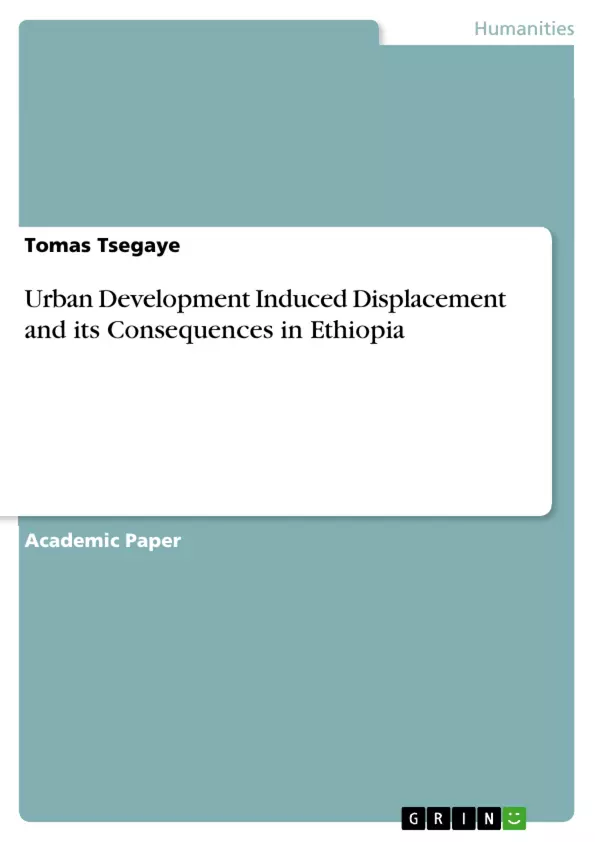People are displaced by development projects, whether roads, rail transportation, water supply, dams and many other projects. While such projects can bring both benefit and costs on the community in the country. Accordingly, this paper intends to examine the urban development induced displacement and its consequences in Ethiopia. The paper used a detailed literature reviews in order to get adequate data. Besides, the paper used different theoretical models for better understanding of the issue. Throughout reading different literature, this paper realize that urban development-induced displacement has various negative consequences on displaced households. It causes health problems, loss job, food insecurity, socio-economic marginalization, weakening of social networks, and annihilation from social organizations.
The empirical findings also show that displaced households use different coping strategies to overcome the problems. Moreover, this paper disclosed that, the Constitution of the Federal Democratic Republic of Ethiopia recognizes that appropriate legal implementation plans for resettlement during development projects and programs. However, on the ground there is gap in rehabilitating the displaced peoples in compensation and empowerment.
Inhaltsverzeichnis (Table of Contents)
- Abstract
- Introduction
- Paper Objective
- Method (Source of Data)
- Theoretical Models on Development Induced Displacement
- Egalitarian Model
- Voluntary Resettlement Model
- Impoverishment Risks and Reconstruction (IRR) Model
- Empirical Findings and Discussion
- Impacts of Urban Development Induced Displacement on Displaced Households
- Displaced Households Coping Strategies
- Government Strategies and Support for Displaced Households
- Conclusion
- References
Zielsetzung und Themenschwerpunkte (Objectives and Key Themes)
This paper aims to provide empirical findings on urban development-induced displacement in Ethiopia. It examines the impact of displacement on households, their coping strategies, and the government's support for displaced populations.
- The negative consequences of urban development-induced displacement on displaced households.
- The coping strategies used by displaced households to address challenges caused by displacement.
- The role and strategies of the government in supporting displaced households.
- The theoretical frameworks and models used to understand development-induced displacement.
- The legal framework surrounding resettlement and compensation for displaced communities.
Zusammenfassung der Kapitel (Chapter Summaries)
- Introduction: This chapter defines displacement and development-induced displacement, highlighting its significant impact on communities globally. It discusses the socio-economic and cultural disruptions caused by displacement, with examples from Ethiopia and other developing countries.
- Paper Objective: This chapter outlines the specific objectives of the paper, focusing on the impact of urban development-induced displacement on displaced households, their coping strategies, and the government's role in supporting them.
- Method (Source of Data): This chapter explains the methodology used to gather data for the paper, emphasizing the use of detailed literature reviews, including research papers, eBooks, journal articles, and government databases.
- Theoretical Models on Development Induced Displacement: This chapter explores different theoretical models that explain development-induced displacement. It delves into the Egalitarian Model, the Voluntary Resettlement Model, and the Impoverishment Risks and Reconstruction (IRR) Model, highlighting their key concepts and implications for displacement and resettlement.
- Empirical Findings and Discussion: This section explores the impacts of urban development-induced displacement on displaced households, including health problems, job loss, food insecurity, socio-economic marginalization, and the weakening of social networks. It also discusses the coping strategies employed by displaced households and the government's efforts to support them.
Schlüsselwörter (Keywords)
This paper focuses on the multifaceted issue of urban development-induced displacement in Ethiopia. Key terms include: displacement, urban development, displaced households, coping strategies, government support, resettlement, compensation, impoverishment, marginalization, and the Ethiopian legal framework surrounding development projects.
- Quote paper
- Masters Tomas Tsegaye (Author), 2021, Urban Development Induced Displacement and its Consequences in Ethiopia, Munich, GRIN Verlag, https://www.hausarbeiten.de/document/1157962


